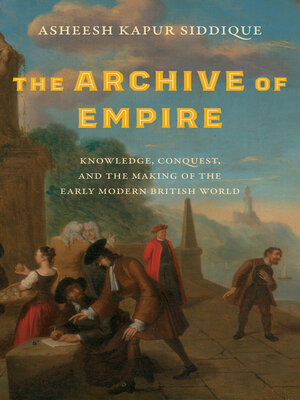The Archive of Empire
ebook ∣ Knowledge, Conquest, and the Making of the Early Modern British World · The Lewis Walpole in Eighteenth-Century Culture and History
By Asheesh Kapur Siddique

Sign up to save your library
With an OverDrive account, you can save your favorite libraries for at-a-glance information about availability. Find out more about OverDrive accounts.
Find this title in Libby, the library reading app by OverDrive.



Search for a digital library with this title
Title found at these libraries:
| Library Name | Distance |
|---|---|
| Loading... |
How modern data-driven government originated in the creation and use of administrative archives in the British Empire
Over the span of two hundred years, Great Britain established, governed, lost, and reconstructed an empire that embraced three continents and two oceanic worlds. The British ruled this empire by correlating incoming information about the conduct of subjects and aliens in imperial spaces with norms of good governance developed in London. Officials derived these norms by studying the histories of government contained in the official records of both the state and corporations and located in repositories known as archives.
As the empire expanded in both the Americas and India, however, this system of political knowledge came to be regarded as inadequate in governing the non-English people who inhabited the lands over which the British asserted sovereignty. This posed a key problem for imperial officials: What kind of knowledge was required to govern an empire populated by a growing number of culturally different people? Using files, pens, and paper, the British defined the information order of the modern state as they debated answers to this question. In tracing the rise and deployment of archives in early modern British imperial rule, Asheesh Kapur Siddique uncovers the origins of our data-driven present.
Over the span of two hundred years, Great Britain established, governed, lost, and reconstructed an empire that embraced three continents and two oceanic worlds. The British ruled this empire by correlating incoming information about the conduct of subjects and aliens in imperial spaces with norms of good governance developed in London. Officials derived these norms by studying the histories of government contained in the official records of both the state and corporations and located in repositories known as archives.
As the empire expanded in both the Americas and India, however, this system of political knowledge came to be regarded as inadequate in governing the non-English people who inhabited the lands over which the British asserted sovereignty. This posed a key problem for imperial officials: What kind of knowledge was required to govern an empire populated by a growing number of culturally different people? Using files, pens, and paper, the British defined the information order of the modern state as they debated answers to this question. In tracing the rise and deployment of archives in early modern British imperial rule, Asheesh Kapur Siddique uncovers the origins of our data-driven present.







